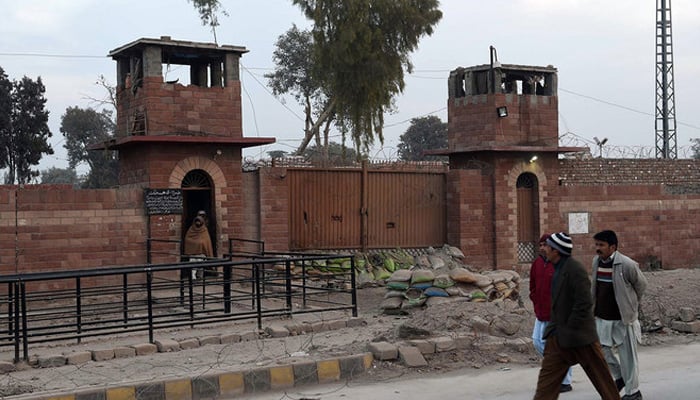
Over a dozen prisoners test HIV-positive at Peshawar Central Jail
”
At least 16 prisoners of Peshawar Central Jail were diagnosed with HIV (human immunodeficiency viruses) after the latest blood screening session, raising risks of the spread of the life-threatening disease among other inmates.
Peshawar Central Jail Superintendent Muhammad Waseem Khan told Geo News that over a dozen prisoners tested positive for HIV after blood screening. He also claimed that the affected inmates were “drug addicts” who had been separated from other prisoners.
The senior officer further said that “3,400 prisoners are currently present at the central jail”. The HIV-positive inmates were being given medical treatment and counselling sessions, he added.
Several surveys conducted by prisoners’ welfare and human rights organisations spotlighted the lack of adequate healthcare facilities, the issue of overcrowding, and outdated bail laws, resulting in creating grave risks of spreading diseases and deaths in Pakistani jails.
‘Overcrowding, inadequate health facilities’
In March 2023, Human Rights Watch (HRW) released a 55-page report titled A Nightmare for Everyone: The Health Care Crisis in Pakistan’s Prisons which documented rampant inadequacies in the country’s prison healthcare, while also mentioning the consequences for 88,000 people who account for the total prison population.
The report cited severe overcrowding in Pakistani jails which is a result of the country’s “outdated and discriminatory bail laws”, as most inmates are “yet to be tried or convicted”.
“Pakistan has one of the world’s most overcrowded prison systems, with cells designed for a maximum of three people holding up to 15. Severe overcrowding has compounded existing health care deficiencies, leaving inmates vulnerable to communicable diseases and unable to get medicines and treatment for even basic health needs, as well as emergencies,” the rights watchdog had stated.
The organisation had documented accounts of 54 people which include former prisoners in Islamabad, Sindh, and Punjab, women and juveniles, counsels of detainees and convicted inmates, advocacy organisations focused on prisoner rights and prison health officials.
It had also found that women were the most vulnerable inmates in Pakistan’s jails, as they suffer from an added layer of “patriarchal societal attitudes, lack of independent financial resources, and abandonment by families”, which contribute to their difficulties as prisoners.
The human rights watchdog’s Associate Asia Director Patricia Gossman had said that the country’s prison system requires “urgent and systemic reforms”
The global human rights organisation had urged the country’s provincial and federal governments to “urgently adopt measures to bring health care in its jails and prisons in line with international standards, such as the Nelson Mandela Rules”.
”

